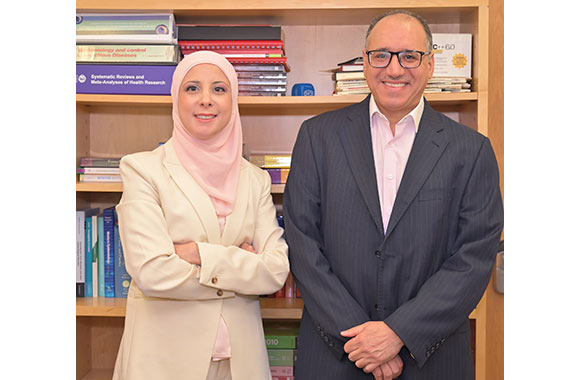
Landmark study reveals How a COVID-19 immunity and virus evolution have shifted across the pandemic
Doha – February 6, 2025: A groundbreaking study led by researchers at Weill Cornell Medicine-Qatar (WCM-Q) has revealed critical insights into the evolving dynamics of immunity against COVID-19 reinfection. The findings highlight a shift in the virus's evolutionary strategy, transitioning from prioritizing increased transmissibility in the pre-Omicron era to enhanced immune evasion in the Omicron period.
The study, published in Nature, was conducted through a Qatar-based collaborative partnership of six institutions and presented population-level epidemiological analyses on over 1.5 million people, covering the four-year span of the pandemic. The study revealed that before the emergence of Omicron, natural immunity provided sustained and robust protection against reinfection, with an estimated effectiveness of around 80%. However, for those infected after the emergence of the Omicron variant, this protection remained strong only in recently infected individuals, rapidly diminishing to negligible levels within a year. These trends were consistent whether reinfection was considered as any infection or limited to symptomatic cases, and were observed in both vaccinated and unvaccinated populations.
The study findings indicate that the emergence of Omicron marked a turning point in the pandemic's trajectory. Before Omicron, the virus evolved by increasing its transmissibility, as a large proportion of the population remained uninfected due to widespread public health interventions. This phase saw the emergence of more transmissible variants, such as Alpha and Delta. In contrast, the Omicron era was characterized by widespread immunity driven by prior infections and vaccinations, which pressured the virus to evolve mechanisms to evade this immunity. This shift led to the rise of highly genetically diverse variants, such as XBB and JN.1.
'This ongoing evolution and immune evasion make it challenging to achieve long-term population immunity against the virus,' said Dr. Hiam Chemaitelly, first author of the study and assistant professor of population health sciences at WCM-Q. 'The short-lived immunity leads to repeated waves of infection, mirroring patterns observed with common cold coronaviruses and influenza. This virus is here to stay and will continue to reinfect us, much like other common cold coronaviruses. Regular vaccine updates are critical for renewing immunity and protecting vulnerable populations, particularly the elderly and those with underlying health conditions.'
Dr. Laith Abu-Raddad, the senior author of the study and professor of population health sciences at WCM-Q, said: 'The virus has shown remarkable adaptability, allowing it to persist in human populations and cause repeated reinfections. Fortunately, these reinfections are almost always mild or asymptomatic. Our study demonstrates that natural immunity provides robust and enduring protection against severe COVID-19 in both the pre-Omicron and Omicron eras, with very few signs of waning. The rapid evolution of the virus has had minimal impact on this protection. While the virus will remain part of our lives, it will no longer pose the same severe threat as it did when it first emerged.'
The study, titled 'Differential Protection Against SARS-CoV-2 Reinfection Pre- and Post-Omicron,' was made possible through funding from the Biomedical Research Program at Weill Cornell Medicine-Qatar. The National Study Group for COVID-19 Epidemiology that produced this study includes, in addition to WCM-Q, Hamad Medical Corporation, the Ministry of Public Health, the Primary Health Care Corporation, Qatar University, and Sidra Medicine.
Home >> Healthcare and Fitness Section
200 Students Dive into Robotics Workshops in Qatar
Artemis Education Appoints World Champion Emma Igelström as Director of Aqu ...
Qatar Insurance Group Recognized at Google Cloud Summit Doha 2025 for Driving In ...
Education Above All Foundation and the American University of Beirut Celebrate t ...
Celebrate Eid with a Summer Glow: Catrice Launches Luxe Highlights for the Seaso ...
Doha Climate Talks Concludes with Enhanced Regional Climate Cooperation Commitme ...
Airline Profitability to Strengthen Slightly in 2025 Despite Headwinds
Luis Gallego Chairs IATA Board
Sony Middle East and Africa and Modern Home Introduce the Next Evolution of Nois ...
The Raptor Roar: A Legacy of High-Performance Off-Road Domination
Saleh Al Hamad Al Mana Co. Launches Special Offer on All-New Nissan Patrol 2025
Raffles doha appoints chef cristhian serraino as head chef of ALBA
essence Is Springing Into Season with the Glowiest Drop: Hydra Kiss LIP OIL
ESG, AI, and Architecture – Object 1's Future-Ready Vision
CASIO Unveils the G-SHOCK GA-2100BM: A Stylish and Durable Summer Essential
SAS Forecasting Hackathon Unveils Future Innovators at University of Doha for Sc ...
Air Cargo Demand up 5.8% in April
Google Cloud Summit Doha Celebrates Two-Year Anniversary of Local Region, Showca ...
Cartier Launches En Équilibre High Jewellery Collection In Stockholm


